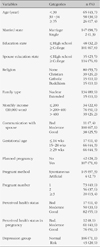Abstract
Purpose
The purpose of the study was to investigate the psycho-social factors such as self-esteem, stress, and family support that affect the depression in pregnant women.
Methods
The participants were 149 pregnant women who were seen at the urban G and M woman hospital. Data were collected using structured questionnaires from January 10 to May 20, 2011, and were analyzed using descriptive statistics, t-test, ANOVA, Pearson Correlation Coefficients, and Stepwise Multiple Regression with SPSS/WIN 17.0 program.
Results
Mean age was 31 years, and 28.9% of the participants reported depression. Depression in the pregnant women showed a negative correlation with self-esteem (r=-.47, p<.001) and family support (r=-.38, p<.001), but a positive correlation with stress (r=.42, p<.001). In addition, variables that predicted depression in pregnant women were general health condition, stress, self-esteem, communication with husband, and planned pregnancy (39.0%).
Figures and Tables
References
1. Agoub M, Moussaoui D, Battas O. Prevalence of postpartum depression in a Moroccan sample. Arch Womens Ment Health. 2005; 8:37–43.

2. Ahn HL. An experimental study of the effects of husband's supportive behavior reinforcement education on stress relief of primigravidas. J Nurs Acad Soc. 1985; 15:5–16.

3. Bae JI. Construction of a postpartum depression model. J Korean Acad Psychiatr Ment Health Nurs. 2002; 11:572–587.
4. Beck AT. Cognitive therapy and emotional disorders. NY: International University Press;1976.
5. Bowen A, Muhajarine N. Prevalence of antenatal depression in women enrolled in an outreach program in Canada. J Obstet Gynecol Neonatal Nurs. 2006; 35:491–498.

6. Brummelte S, Galea LA. Depression during pregnancy and postpartum: Contribution of stress and ovarian hormones. Prog Neuropsychopharmacol Biol Psychiatry. 2010; 34:766–776.

7. Cantwell R, Cox JL. Psychiatric disorders in pregnancy and the puerperium. Curr Obstet Gynecol. 2006; 16:14–20.

8. Choi SK, Ahn SY, Shin JC, Jang DG. A clinical study of depressive symptoms during pregnancy. Korean J Obstet Gynecol. 2009; 52:1102–1108.
9. Cox JL, Holden JM, Sagovsky R. Detection of postnatal depression: Development of the 10-item Edinburgh Postnatal Depression Scale. Br J Psychiatry. 1987; 150:782–786.
10. Cox JL, Murray D, Chapman GA. Controlled study of the onset, duration and prevalence of postnatal depression. Br J Psychiatry. 1993; 163:27–31.

11. Field T, Diego M, Hernandez-Reif M, Schanberg S, Kuhn C, Yando R, et al. Pregnancy anxiety and comorbid depression and anger effects on the fetus and neonate. Depress Anxiety. 2003; 17:140–151.

12. Gavin NI, Gaynes BN, Lohr KN, Meltzer-Brody S, Gartlehner G, Swinson T. Prenatal depression: A systemic review of prevalence and incidence. Obstet Gynecol. 2005; 106:1071–1083.
14. Jeon BJ. Self-esteem: A test of its measurability. Seoul: Yonsei University;1974. Unpublished doctoral dissertation.
15. Jo L. A study on factors influencing the health promoting behaviors in postpartum women. Gwangju: Chonnam National University;1998. Unpublished master's thesis.
16. Kim HW, Jung YY. Influencing factors on antenatal depression. Korean J Women Health Nurs. 2010; 16:95–104.

17. Kim MW, Yang HS, Kim JR. A study on agreements among screening tests and related factors with postpartum depression. Korean J Obstet Gynecol. 2009; 52:1133–1143.
18. Kim SJ, Yang SO, Jeong GH. Physical and psychological symptoms of pregnancy experienced by pregnant couples. Korean J Women Health Nurs. 2004; 10:200–209.

19. Kwon M. Antenatal depression and mother-fetal interaction. J Korean Acad Child Health Nurs. 2007; 13:416–426.
20. Lasarus RS, Folkman S. Stress, appraisal, and coping. NY: Springer;1984.
21. Lee DT, Chan SS, Sahota DS, Yip AS, Tsui M, Chung TK. A prevalence study of antenatal depression among Chinese women. J Affect Disord. 2004; 82:93–99.

22. Leigh B, Milgrom J. Risk factors for antenatal depression, postnatal depression, and parenting stress. BMC Psychiatry. 2008; 8(24):1–11.

23. Marcus SM. Depression during pregnancy: Rates, risks and consequences. Can J Clin Pharmacol. 2009; 16:e15–e22.
24. Mckee DM, Cunningham M, Jankowski KR, Zayas L. Health related functional status in pregnancy: Relationships to depression and social support in a multiethnicpopulation. Obstet Gynecol. 2001; 97:988–993.

25. Milgrom J, Ericksen J, McCarthy R, Gemmill AW. Stressful impact of depression on early mother infant relations. Stress Health. 2006; 22:229–238.
26. Mohammad KI, Gamble J, Creedy DK. Prevalence and factors associated with the development of antenatal and postnatal depression among Jordanian women. Midwifery;2010. in press available online December 4, 2010. www.elsevier.com/midw.
27. O'Keane V, Marsh MS. Depression during pregnancy. BMJ. 2007; 334:1003–1005.
28. Pajuloa M, Savonlahtia E, Sourandera A, Heleniusb H, Pihaa J. Antenatal depression, substance dependency and social support. J Affect Disord. 2001; 65:9–17.

29. Raymond JE. Creating a safety net: Women's experiences of antenatal depression and their identification of helpful community support and services during pregnancy. Midwifery. 2009; 25:39.

30. Rosenberg M. Society and the adolescent self image. Princeton, NJ: Princeton University Press;1965.




 PDF
PDF ePub
ePub Citation
Citation Print
Print







 XML Download
XML Download